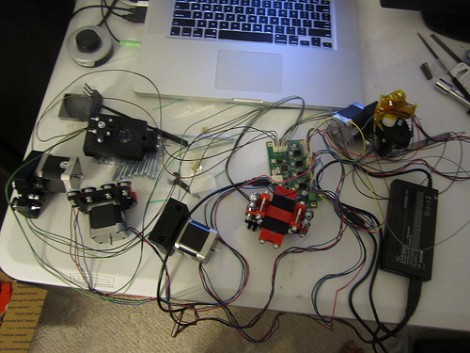
Hey everybody, [Nbitwonder] is building his own RepRap 3D printer. What’s special about that? Well, not much and and lot all at the same time. The art of building a self-replicating 3d printer still has a lot to do with luck and forum-crawling to make all of the decisions that go into this complicated project.
Back in March [Nbitwonder] did a collaborative project over at Thingiverse and scored himself a set of printed parts from a guy who already has one of these printers. He then order a set of the non-printable hardware and has since been assembling it. If you’re interested but haven’t already taken the plunge, there’s enough pictures and information in this set of posts to satisfy your craving… for now.
We say this build is an art because it goes beyond just plunking the pieces together. Take the print head, for instance. Instead of going with the extruder that is considered the default for a Mendel build, [Nbitwonder] is working on a variation called Greg’s Hinged Accessible Extruder. We can’t wait until the hardware assembly is done, because it’s the calibration that really interests us.















Hope this doesn’t go against comment policy, but you have a little mishap in about the second sentence there.. Other than that, awesome post!
and and so what? ;)
I would love to see one of these that not only prints the parts but also assembles them ready to go and sets it off making the next one (:
Seems like the HAD crew is starting to really get into these DIY 3D printers. I know how they feel, it looks pretty darn cool looking at this stuff online.
Then recently I was lucky enough to win a Makerbot so I’m just starting out.
I will say this, there is a void in availability of proper calibration tips. There are some decent discussion on what to tweak when you observe X thing happening, but X thing is not explained.
There should be a tutorial with a hundred pictures, each of a particular problem in a print. It would be something like “If your printed object looks like this, we call that so-and-so and you should try adjusting this and that. That makes sense to me but I can’t seem to find anything like it.
Oddly, my interest is completely opposite of the author… I am most interested in the mechanical aspect.
I REALLY want to build my own printer, it’s the electrical/control aspect that I am completely ignorant about. I fear spending the time and money and not being able to make it actually function. :-/
Gregs Hinged is a fork of the reliable Wade’s that has been the go to for over a year now. Greg made it easy to open up in the event of a jam. It’s quickly becoming the new default extruder. It’s only issue is that it does not have a guide above the idler bearing / hobbed bolt. So hobbed bolts that do not have a nice deep groove will tend to walk the filament off to the smooth side of the bolt. This is fixed by grooving your bolt before hobbing it.
I always groove my bolt before I hobb it. :) I have no idea what that means.
I’m told I have a very groovy bolt, but I’m not sure I want it hobbed. I guess it’s a very personal choice.
@Charles: I was surfing Thingiverse, and I think somebody on Thingiverse took care of this: http://www.thingiverse.com/thing:7700
Once I get the printer working, I’ll probably try and print that off.
As proven recently at the Bath “masterclass” one person can just about build a printer in 24 hours (with a few little bits of help!).
We had a pre-calibrated firmware which did save a lot of time in getting recognisable print out.
If you’re not into the electronics side of things you can buy pre-made controllers, but you will still need to do some calibration work and put the results into the firmware. Things like measuring how many rotations feed how much filament or move how far in x,y,z directions.
Then you need to “calibrate” skeinforge. This needs a lot more work and lots of test pieces being printed. Be warned, documentation on skeinforge is sketchy. You can use other tools to do the job but they tend to be a lot less tunable.
Yes – I agree the calibration is where the meat is at. All the rest can be learned as you go alon as long as you are a moderately handy and logical person. I am printing OK but still need loads of calibration to go :(
Exactly how many of the parts on that table are self-replicating again?
I hear that a lot, but until a repcrap makes stepper motors and printed circuits and microcontrollers, instead of just a few undistinguished and redundant structural parts, its still total bullshit.
Shenanigans
If you’re really interested in the reprap, check out their IRC channel on freenode #reprap
After Wanting a 3d printer for some time, I finally got into the community. I don’t have a printer yet, but I’ve already designed a new controller board for it, and I’m working on a second one now. There is a cheaper version of the Mendel that is now recommended called the Prusa Mendel (Josef Prusa is the designer of this varient) that is easier to assemble, and uses less pieces.
Personally I’ve come to the realization that the reprap will never be able to fully replicate itself (only a CNC Mill could do this) and I am designing my 3d printer using aluminum framing. With the right design, aluminum t-slot can be pre-cut and assembled in hours and a lot more precise than drill-rods.